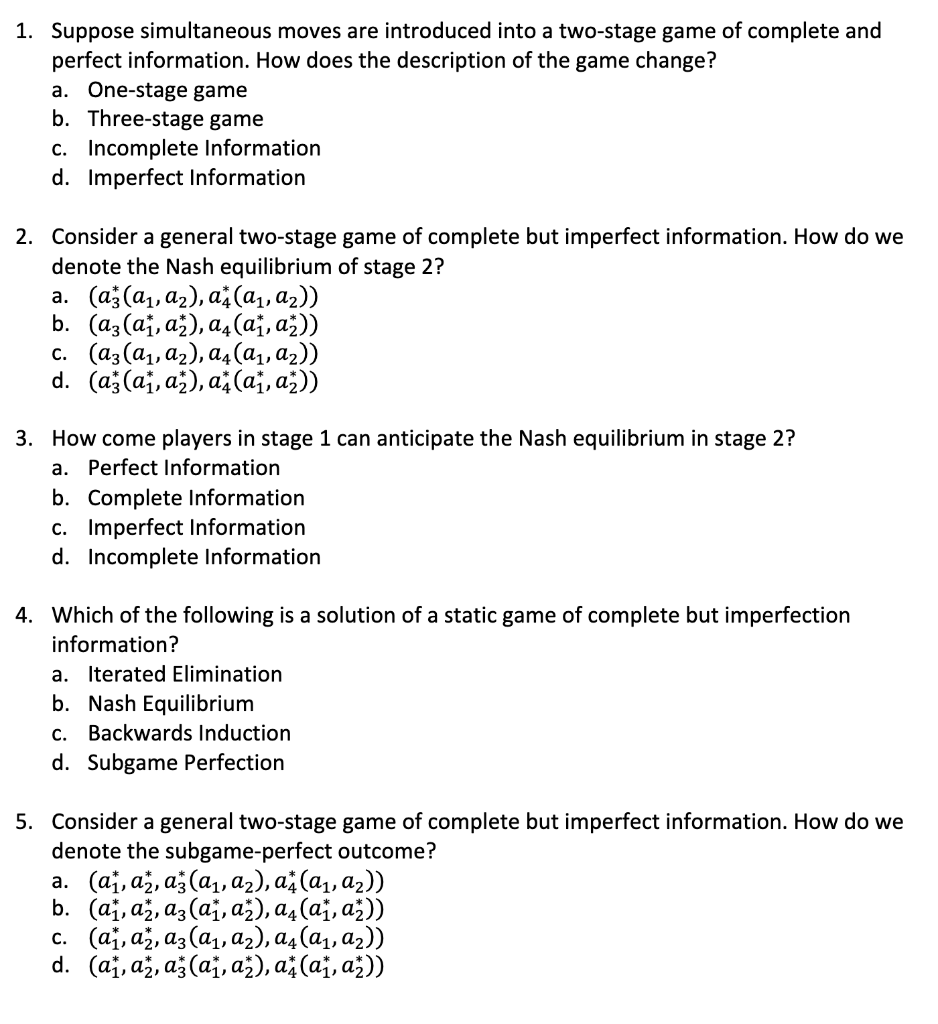1. Suppose simultaneous moves are introduced into a two-stage game of complete and perfect information. How does the description of the game change? a. One-stage game b. Three-stage game c. Incomplete Information d. Imperfect Information 2. Consider a general two-stage game of complete but imperfect information. How do we denote the Nash equilibrium of stage 2? a. (aż (a₁, a₂), a4 (α₁, α₂)) b. (az (aj, aż), a4(a₁, a₂)) c. (a3(a₁, A₂), a4 (α₁, α₂)) d. (az (a₁, a₂), a¹(a₁, až)) 3. How come players in stage 1 can anticipate the Nash equilibrium in stage 2? a. Perfect Information b. Complete Information c. Imperfect Information d. Incomplete Information 4. Which of the following is a solution of a static game of complete but imperfection information? a. Iterated Elimination b. Nash Equilibrium c. Backwards Induction d. Subgame Perfection 5. Consider a general two-stage game of complete but imperfect information. How do we denote the subgame-perfect outcome? a. (a₁, a₂, až (α₁, α₂), a(α₁, α₂)) b. (a, a, a, (a₁, a₂), a (a₁, ₂)) c. (a, a, a3 (a₁, a₂), a4 (α₁, α₂)) (a₁, a₂, a (a₁, a₂), a (a₁, ₂)) d.
1. Suppose simultaneous moves are introduced into a two-stage game of complete and perfect information. How does the description of the game change? a. One-stage game b. Three-stage game c. Incomplete Information d. Imperfect Information 2. Consider a general two-stage game of complete but imperfect information. How do we denote the Nash equilibrium of stage 2? a. (aż (a₁, a₂), a4 (α₁, α₂)) b. (az (aj, aż), a4(a₁, a₂)) c. (a3(a₁, A₂), a4 (α₁, α₂)) d. (az (a₁, a₂), a¹(a₁, až)) 3. How come players in stage 1 can anticipate the Nash equilibrium in stage 2? a. Perfect Information b. Complete Information c. Imperfect Information d. Incomplete Information 4. Which of the following is a solution of a static game of complete but imperfection information? a. Iterated Elimination b. Nash Equilibrium c. Backwards Induction d. Subgame Perfection 5. Consider a general two-stage game of complete but imperfect information. How do we denote the subgame-perfect outcome? a. (a₁, a₂, až (α₁, α₂), a(α₁, α₂)) b. (a, a, a, (a₁, a₂), a (a₁, ₂)) c. (a, a, a3 (a₁, a₂), a4 (α₁, α₂)) (a₁, a₂, a (a₁, a₂), a (a₁, ₂)) d.
Chapter8: Game Theory
Section: Chapter Questions
Problem 8.9P
Related questions
Question
Ma2.

Transcribed Image Text:1. Suppose simultaneous moves are introduced into a two-stage game of complete and
perfect information. How does the description of the game change?
a. One-stage game
b. Three-stage game
c. Incomplete Information
d. Imperfect Information
2. Consider a general two-stage game of complete but imperfect information. How do we
denote the Nash equilibrium of stage 2?
a. (az (a₁, a₂), a (α₁, α₂))
b. (az (a₁, a₂), a4 (α₁, α₂))
c. (az (a₁, A₂), a4 (α₁, α₂))
d. (a(a₁, a₂), a (a₁, ₂))
3. How come players in stage 1 can anticipate the Nash equilibrium in stage 2?
a. Perfect Information
b. Complete Information
c. Imperfect Information
d. Incomplete Information
4. Which of the following is a solution of a static game of complete but imperfection
information?
a. Iterated Elimination
b. Nash Equilibrium
c. Backwards Induction
d. Subgame Perfection
5. Consider a general two-stage game of complete but imperfect information. How do we
denote the subgame-perfect outcome?
a. (a, a, a (a₁, a₂), a (α₁, ₂))
b. (a, a, a, (a₁, až), α₁ (α₁, ₂))
c. (a, a, a3 (a₁, A₂), α₁ (α₁, α₂))
(a₁, a, a (a₁, a₂), a (a₁, a₂))
d.
Expert Solution
This question has been solved!
Explore an expertly crafted, step-by-step solution for a thorough understanding of key concepts.
Step by step
Solved in 2 steps

Knowledge Booster
Learn more about
Need a deep-dive on the concept behind this application? Look no further. Learn more about this topic, economics and related others by exploring similar questions and additional content below.Recommended textbooks for you


Principles of Microeconomics (MindTap Course List)
Economics
ISBN:
9781305971493
Author:
N. Gregory Mankiw
Publisher:
Cengage Learning

Principles of Economics (MindTap Course List)
Economics
ISBN:
9781305585126
Author:
N. Gregory Mankiw
Publisher:
Cengage Learning


Principles of Microeconomics (MindTap Course List)
Economics
ISBN:
9781305971493
Author:
N. Gregory Mankiw
Publisher:
Cengage Learning

Principles of Economics (MindTap Course List)
Economics
ISBN:
9781305585126
Author:
N. Gregory Mankiw
Publisher:
Cengage Learning

Principles of Economics, 7th Edition (MindTap Cou…
Economics
ISBN:
9781285165875
Author:
N. Gregory Mankiw
Publisher:
Cengage Learning

Principles of Microeconomics
Economics
ISBN:
9781305156050
Author:
N. Gregory Mankiw
Publisher:
Cengage Learning

Exploring Economics
Economics
ISBN:
9781544336329
Author:
Robert L. Sexton
Publisher:
SAGE Publications, Inc